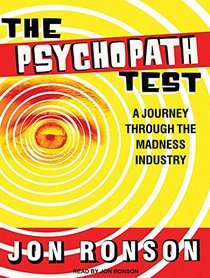Helpful Score: 2
A scattershot look at psychopathy, and in some parts, just more general crazy.
Probably the most valuable perspective Ronson provides is what he calls "semi-psychopaths." Bob Hare, who has a short test to determine if someone is a psychopath, and Martha Stout, who wrote the book "The Sociopath Next Door," see the defining trait of psychopathy/sociopathy as a lack of empathy, and see it as an on/off switch. Most aspects of human behavior aren't on/off switches, they're continuums (continuuae?).
It's much easier for me to accept there are people out there with relatively few feelings for fellow humans (who, it seems to me, would be cool in tense situations - good in war, hostage standoffs, espionage), some with a little more, and then some with so much they're always anxious. I could believe, too, a very few have absolutely none and literally treat all other humans as objects.
Hare and Stout don't have it that way, and they have the official model right now. Hare's checklist also discounts that environment could temporarily affect things - for instance, being a coroner or an EMT could numb one to human suffering without meaning that person's amygdala is malfunctioning and the only thing keeping her from killing for fun is the inconvenience of it.
So, anyway, I hope Ronson's view in this (non-scientific, journalistic, occasionally humorous) book gets some traction.
Probably the most valuable perspective Ronson provides is what he calls "semi-psychopaths." Bob Hare, who has a short test to determine if someone is a psychopath, and Martha Stout, who wrote the book "The Sociopath Next Door," see the defining trait of psychopathy/sociopathy as a lack of empathy, and see it as an on/off switch. Most aspects of human behavior aren't on/off switches, they're continuums (continuuae?).
It's much easier for me to accept there are people out there with relatively few feelings for fellow humans (who, it seems to me, would be cool in tense situations - good in war, hostage standoffs, espionage), some with a little more, and then some with so much they're always anxious. I could believe, too, a very few have absolutely none and literally treat all other humans as objects.
Hare and Stout don't have it that way, and they have the official model right now. Hare's checklist also discounts that environment could temporarily affect things - for instance, being a coroner or an EMT could numb one to human suffering without meaning that person's amygdala is malfunctioning and the only thing keeping her from killing for fun is the inconvenience of it.
So, anyway, I hope Ronson's view in this (non-scientific, journalistic, occasionally humorous) book gets some traction.
Helpful Score: 1
Readers new to Jon Ronson may initially be taken aback by his writing style. Unlike a typical non-fiction book, his reads more like a narrative in which he bumbles about and somehow manages to score interviews with all sorts of people. In The Psychopath Test, he meets a charming convict who may or may not be a psychopath, the author of the checklist used to determine whether or not someone is a psychopath, and a Scientologist crusader against the psychiatric industry. Rather than blatantly taking a stand for or against the psychiatric industry, Ronson does what he did in "Them" by pointing out that extremists of any kind can be dangerous.
Martha R. - , reviewed The Psychopath Test: A Journey Through the Madness Industry on + 9 more book reviews
Helpful Score: 1
This is a somewhat strange book. It begins and ends with a "mystery," that seems to have nothing to do with the rest of the book. I guess that I feel the book promises more than it delivers. It talks about the author's expereince with an instrument, a checklist, that purports to identify psychopaths. I have only an average layperson's knowledge about psychology, and there was nothing in this book that I didn't already know from reading popular literature - "psychopaths lack empathy." The author discusses his meetings with and impressions of three people - one of these is a corporate businessman. But there is not anything in the book that would bring us to the conclusion that most of America's corporate businessman are psychopaths, as the advertising claims. Could be possible, but you can't know from this book.
The author's encounter with Tony, a man who is imprisoned at Broadmoor, England's famous hospital for the criminally insane, is interesting. But in general I found the book very unsatisfying and wonder why Ronson wrote it - it was not even well-written.
The author's encounter with Tony, a man who is imprisoned at Broadmoor, England's famous hospital for the criminally insane, is interesting. But in general I found the book very unsatisfying and wonder why Ronson wrote it - it was not even well-written.




